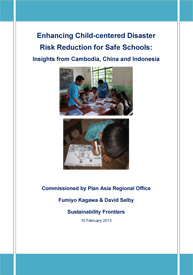Outcome of Sustainability Frontiers’ Safe School Research for Plan International in Cambodia, China and Indonesia Published
The research report arising from Sustainability Frontiers’ Safe School Research consultancy for Plan International Asia Regional Office, Enhancing Child-centered Disaster Risk Reduction for Safe Schools: Insights from Cambodia, China and Indonesia, has just been published by the Plan Asia Regional Office
The research was undertaken by Fumiyo Kagawa and David Selby between September 2012 and February 2013. Focusing on developments in Cambodia, China and Indonesia, the objective of the research was to examine what taking a child rights approach to school safety means within the overall aim of ensuring children’s access to quality education. The research aimed at understanding children’s rights to quality education and school safety from the perspective of children’s experiences and those of their communities. For further details of the consultancy and its research questions, click here.
The following summary of the report was drawn up for Plan International:
The research reveals that adult stakeholders focus on physical rather than curricular aspects of the safe school citing a range of hazards going beyond the climatological and geo-seismic. Although there is strong support for child participation in safe school initiatives, that participation tends to be conceived, outside of CSOs, as a matter of children being active as they follow adult instruction. A richer and deeper understanding of child participation needs wider cultivation. Use of child-to-child peer learning approaches with marginalized children on safe school initiatives is limited and the voice of the marginalized is missing from learning approaches and materials. Some significant developments in inter-ministerial and inter-sectorial collaboration and coordination for child rights-based safe schooling at national level are noted but not found replicated to any extent at sub-national level. Indonesia has established national guidelines covering both structural and non-structural components of school safety through a rich consultative process while Cambodia is close to finalizing guidelines. China so far shows no sign of guidelines being developed. Existing Child Friendly School initiatives in Cambodia and China have great potential for building synergies with child-centered disaster risk reduction. Strategic links between climate change adaptation education and the safe school are currently missing. Systematic safety and risk reduction across-the-subjects and through-the-grades curricular provision has yet to be developed and teachers need further grounding and support in facilitating participatory pedagogies. Current and anticipated CSO roles in supporting safe school initiatives include: a networking and policy advocacy role; a safe school innovation role; a role as safe school providers at local level where government-led initiatives are absent or insufficient; an ongoing catalytic and facilitative role in supporting and monitoring government efforts. There is a need for clearer and fuller delineation of roles for all school level stakeholder groups in taking forward school-based and school-in-community safety and disaster risk reduction initiatives.
To access the full report, click here.

